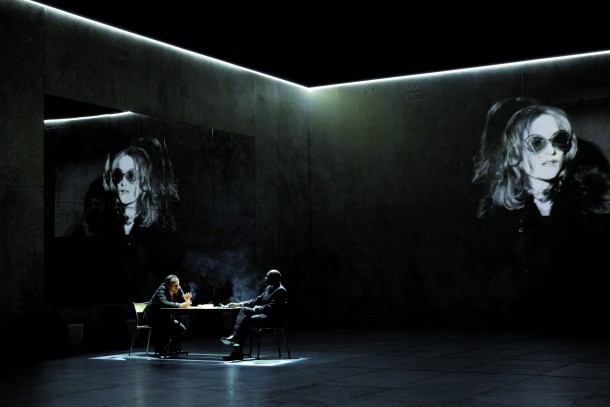
Director: Krzysztof Warlikowski | Dramaturgy Piotr Gruszczynski
Performed by: Isabelle Huppert, Agata Buzek, Andrzej Chyra, Alex Descas, Gael Kamilindi, Norah Krief, Rosalba Torres Guerrero, Gregoire Leaute
220min | Drama | Poland | France
It seems fitting that one of Greek tragedy’s most controversial figures should be played by one of film and stage’s most enigmatic French actors, Isabelle Huppert, who makes a rare London appearance to play three roles (Aphrodite, Phaedra and Elizabeth Costello) in Krzysztof Warlikowski’s radical and visionary French Polish production which bewilders and bewitches despite occasional longueurs.
His PHAEDRA(S) takes the form of three versions of the Greek myth, blending fresh material from Lebanese-Canadian playwright Wajdi Mouawad with the provocative text of Sarah Kane’s brutal ‘Phaedra’s Love’ and extracts from J M Coetzee’s novel ‘Elizabeth Costello’.
In 2010, Warlikowski cast Huppert in his version of A Streetcar Named Desire and this captured his imagination to create her three incarnations here as she morphs seamlessly from the sexually manipulative Aphrodite taking revenge on Hippolytus, then switching to Phaedra and finally to the perverse Elizabeth Costello.
Hot on the heels of her intoxicating performance in Paul Verhoeven’s outré ‘rape comedy’ ELLE, that premiered at Cannes in May, Huppert struts provocatively around the stage in a range of raunchy rigouts from Dior, Hedi Slimane for Saint Laurent and Givenchy during an evening that perpetually teeters on the brink of elegant outrage. During the opening scenes she strips down to her blood-stained undies before girating in angst-ridden love-sickness on a bed, throwing up into a sink and fatally climaxing in the arms of her step-son Hyppolyte 1, a coltishly exotic Gaël Kamilindi who slinks in as a black dog.
In the second and most protracted segment, Andrzej Chyra (In the Name Of) plays Hippolyte as a bored and bloated playboy sulking in a sliding glass enclosure (representing his regal quarters) where he is entertained by the intoxicatingly rhythmic dance routines of Rosalba Torres Guerrero while Hitchcock’s Psycho plays in the background, in the first of the production’s three references to the film world. Jessica Lange’s lobotomy scene in Clifford’s Frances (1982) plays during the final Coetzee segment along with Pasolini’s ’60s allegory Teorema, which cleverly draws a parallel with Silvana Mangano’s chic but sexually frustrated Milanese mother. In final strand Huppert plays conference speaker Elizabeth Costello who disdains Chyra’s intellectually arrogant interviewer during a conference debate that uses Frances, German Romantic poet Höderlin who incorporated Greek tragedy into his 19th century works, and Racine’s 17th century version of Phèdre as its pivotal conversation points. Of the three parts, this is possibly the most amusing but also the most challenging.
In sharp contrast to the starkly elegant stage sets (marbled walls, chrome shower heads and contemporary low level Italian furniture) and haute couture, the cast bravely submits to the full complement of human physical and emotional degradations: crying, pleading, throwing up, bleeding and crawling on all fours with open legs.
Isabelle Huppert’s coruscating emotional intensity ranges from the sarcastically perverse Costello to the proud posturing of Aphrodite and the clipped sardonic diction and soulful sobbing of Phaedra, making us scorn and then pity her characters within minutes. Amusement jostles shock and contempt. Agata Buzet (11 Minutes) is potently feline and as Phaedra’s real daughter Strophe. And there is a dizzying dance from Guerrero. Complimented by Pawel Mykietyn’s arresting atmospheric score this is an often bewildering but ultimately rewarding production. MT
PHAEDRA(S) | BARBICAN THEATRE EC2 | TICKETS AVAILABLE HERE